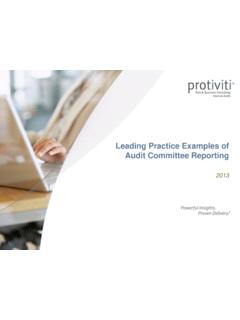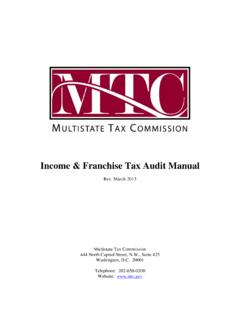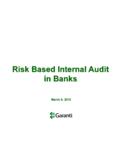Transcription of Nonprofit Revitalization Act - Lawyers Alliance for New York
1 Dated as of march 2016 New York Nonprofit Revitalization Act of 2013 Frequently Asked Questions Table of Contents Amending Corporate Purposes .. 2 Applicability .. 2 Attorney General Review .. 3 Audit Oversight .. 3 Audit Thresholds .. 7 Board Chair .. 8 Charitable Reporting .. 8 Charitable Trusts .. 9 Committees .. 9 Conflict of Interest Policy .. 10 Compliance .. 11 Corporate Type .. 12 Duties of Board Members .. 13 Effective Date .. 13 Entire Board .. 13 Foreign Corporations .. 14 Fundraising .. 14 Executive Compensation .. 14 Incorporation 15 Independent Directors .. 15 Members .. 19 Notice of Meetings .. 20 Participation in Board Meetings .. 21 Proxy Voting .. 21 Real Estate Transactions .. 21 Related Party and Related Party Transactions .. 21 Penalties .. 25 Unanimous Written Consent.
2 25 Videoconferencing and Teleconferencing .. 26 Whistleblower Policy .. 26 Enacted in 2013 , the New York Nonprofit Revitalization Act ( NPRA or Act ) comprehensively overhauled the New York Not-for-Profit Corporation Law ( N-PCL ). Most provisions of the NPRA took effect July 1, 2014. Since, then, the NPRA has been amended several times, most recently in December 2015. This FAQ s document is intended to help Nonprofit organizations understand some of the trickier aspects of the NPRA and its amendments. Amending Corporate Purposes Question: How will a not-for-profit corporation amend its Certificate of Incorporation under the new system? Answer: Charitable not-for-profit corporations amending their corporate purposes will still have to get approval for that amendment and then file the amendment with the Department of State.
3 However, section 804(a) of the New York Not-for-Profit Corporation Law ( N-PCL ) provides that charitable corporations may either secure the consent of either the Supreme Court upon notice to the Attorney General, or of the Attorney General s office itself. Previously, the only option was to obtain the consent of the Supreme Court upon notice to the Attorney General. Applicability Question: Does the Act apply if our organization is not a public charity under federal law? Answer: The Act applies to all not-for-profit corporations formed under New York State law, even if the corporation is a private foundation under federal law, and even if the organization is not tax exempt at all under section 501(c)(3) or other provisions of the Internal Revenue Code ( IRC ).
4 Question: Does this Act apply to not-for-profit corporations incorporated out of state, but operating in New York? Answer: If an organization is registered to conduct charitable solicitations or to hold charitable assets in New York State, then the changes in audit thresholds apply regardless of the organization s state of incorporation. The other provisions of the NPRA do not apply to organizations incorporated in other states but operating in New York. Question: If we have a fiscal sponsor and are working on becoming a separate tax exempt corporation, does this new law apply to us? Answer: Formation as an entity is a matter of state law; 501(c)(3) tax-exempt status is a matter of federal law, in particular the IRC. If the organization is incorporated under the N-PCL, then it will need to comply with the N-PCL regardless of whether or not it has yet to receive tax-exempt status.
5 2 Attorney General Review Question: Is there any indication of the circumstances under which the New York Attorney General s office ( NYAG ) will exercise its discretion to review a dissolution, sale of assets, or merger, versus when it will require Supreme Court review? Answer: According to guidance issued by the NYAG on June 23, 2014, circumstances in which the NYAG may determine that Supreme Court review of a merger is appropriate include: (i) if members of a constituent corporation or members of the public have complained or expressed opposition, (ii) if the transaction will have a significant impact on the public or raises conflicts of interests, (iii) if assets of a merging corporation are held for a specific purpose requiring court approval, and/or (iv) if the NYAG has objections that have not been resolved after discussion.
6 See According to guidance issued by the NYAG on September 24, 2014 and updated February 3, 2016, circumstances in which the NYAG may determine that Supreme Court review of a sale or other dispositions of assets is appropriate include: (i) if the corporation is insolvent, (ii) if the NYAG has received complaints or objections from interested parties entitled to notice, (iii) if the transaction is unusually complex or will have an impact on the public, and/or (iv) if the NYAG has objections that have not been resolved after discussion. See According to guidance issued by the NYAG on October 6, 2014, circumstances in which the NYAG may determine that Supreme Court review of a dissolution with assets is appropriate include: (i) if the NYAG has received complaints or objections from interested parties and/or (ii) if the NYAG has objections that have not been resolved after discussion.
7 See Audit Oversight Question: If we're not required to have an audit, but we do have an audit, do the same requirements as to Board oversight apply? Answer: The provisions related to the audit function are specifically tied to revenue thresholds ( $500,000 & over, and $1,000,000 & over). If your organization has less than $500,000 in revenue and chooses to complete an audit, then it does not have to comply with the audit requirements of the NPRA (this threshold will increase to $750,000 for annual reports filed with the NYAG on or after July 1, 2017). Having said that, it is advisable as a best practice for the Board participate in the selection of the auditor, set the scope of the audit and speak with the auditor after the audit is completed. Question: How does the Nonprofit demonstrate that the Board or Audit Committee has reviewed the selection of the auditor.
8 Is email sign off sufficient? Answer: As to how the Board or Audit Committee demonstrates that it has signed off on the selection of the auditor, the scope of the audit and the final audit report, the best way to memorialize this review is to note it in the minutes of a Board meeting or in the minutes of a 3 committee meeting. Email approval would be appropriate if it was in the form of unanimous written consent by the Board or board committee, without a meeting. For example, if the Audit Committee was not meeting in person or by phone and you wanted to circulate the auditor's engagement letter to the committee for approval, and committee members were going to approve it through unanimous written consent, then the email sign off would be fine as long as each member emails their consent.
9 Question: Can Finance Committee serve the function of the Audit Committee? Answer: If an organization is required to file audited financial statements, the new statute provides that the retention of the auditors and review of the audit results and any management letter must be approved by the Board of Directors or an Audit Committee comprised of Independent Directors. If the organization has a Finance but not an Audit Committee, then consider expanding the scope of the Finance Committee s authority to include audit oversight and changing the committee s name. Some practitioners interpret the Act as requiring a separate committee whose function is to oversee the audit process. Question: Are we required to change auditors; and if so, how often do we need to do so?
10 Answer: New York law does not require an organization to change auditors. There is not a clear consensus among Nonprofit leaders about whether or how often it is necessary to change auditors. The decision should be informed by the auditors performance. A review of that performance by the Board, or by an Audit Committee comprised solely of Independent Directors, is required by the new law. Question: Does the auditor need to present its findings to the entire Board or just a smaller committee of the Board? Answer: The Board or Audit Committee must review the results of the audit and any related management letter with the independent auditor. According to guidance issued by the NYAG on February 24, 2015, review of communications to those charged with governance (including the management letter) resulting from the audit requires a conversation between the Committee and the independent auditor in which audit committee members participate; a face-to-face meeting is not required.






